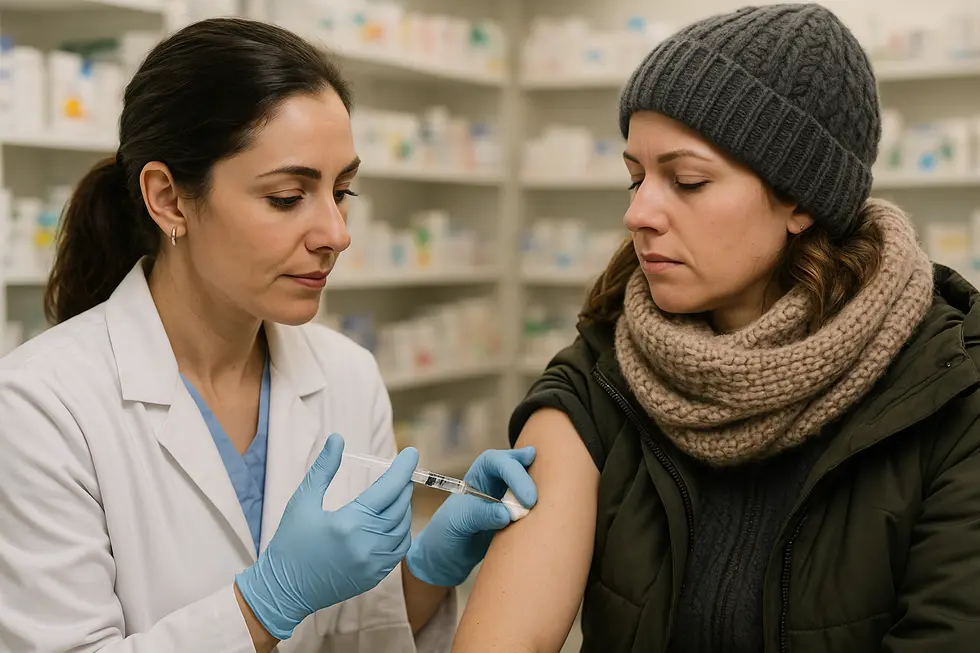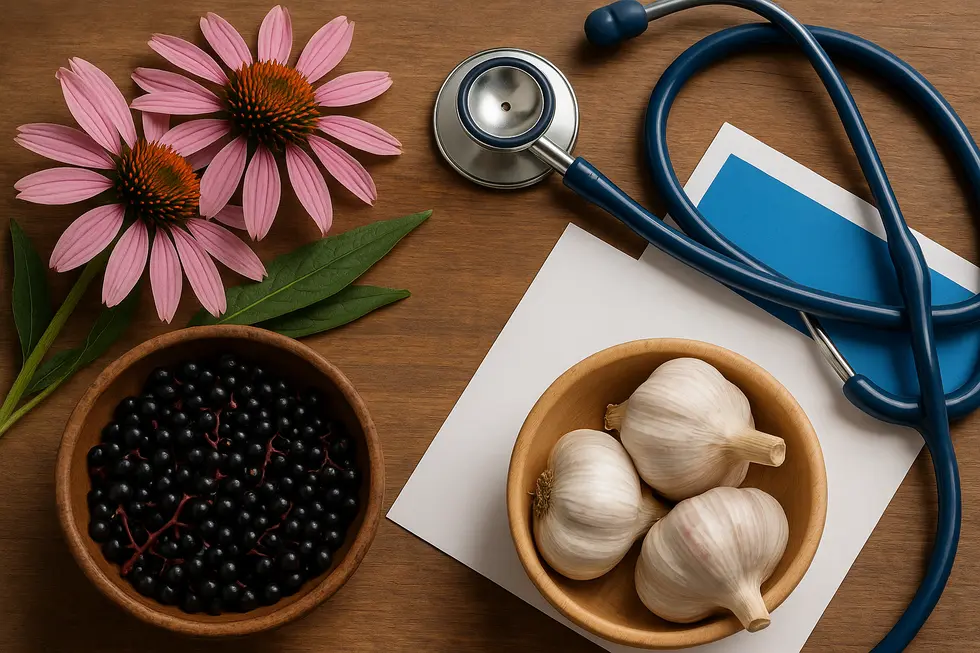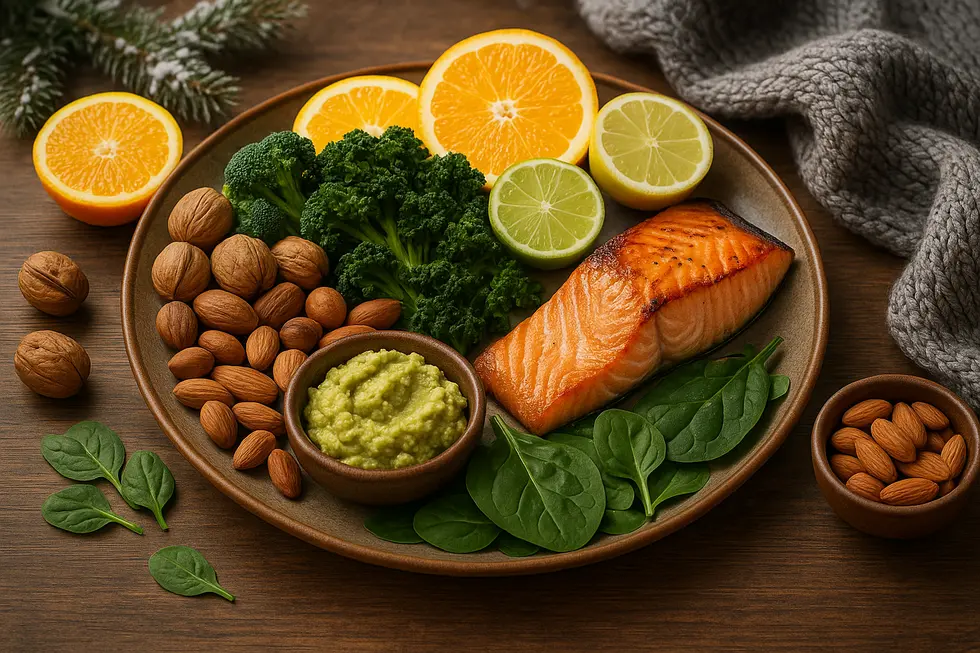General Wellness
Winter Wellness: Your Complete Guide to Flu Prevention
Understanding Winter Flu Prevention
As winter approaches, protecting ourselves against seasonal influenza becomes especially important for maintaining good health. The annual flu season in the UK typically runs from October to March, with potentially serious consequences for vulnerable individuals. This comprehensive guide explores both proven medical interventions and supportive natural approaches to flu prevention. We’ll examine how vaccination works alongside your body’s immune system, nutritional strategies to bolster your defences, essential hygiene practices, and evidence-based complementary approaches. By understanding these multiple lines of defence, you’ll be better equipped to make informed decisions about protecting yourself and your loved ones this winter season.
Winter Flu Prevention: Nutritional Approaches to Boosting Immunity

1. Exploring the Potential of Herbal Remedies in Flu Prevention
Herbal remedies have long been touted as natural allies in the sphere of health, often celebrated for their potential role in bolstering the immune system. However, when it comes to flu prevention, the scientific evaluation of herbal remedies presents a complex picture. The innate appeal of herbs lies in their traditional use and anecdotal evidence suggesting immune-boosting properties. However, it is essential to approach these remedies with a critical eye and consider the existing scientific research.
Research indicates that some herbal remedies, like Echinacea purpurea, may offer mild immune support, primarily by enhancing the body’s cytokine production and increasing the activity of macrophages. Other herbs, such as garlic (Allium sativum), are reputed for their antimicrobial properties, yet their direct effect on flu virus prevention remains unclear and warrants further investigation. The MHRA advises caution when using herbal supplements, especially in conjunction with prescribed medications.
As per NHS recommendations, individuals considering the inclusion of herbal remedies in their flu prevention strategies should consult with their healthcare providers. Herbs can interact with conventional medications, and their efficacy is not uniform across all individuals. Furthermore, GPhC standards require transparency about the limitations of herbal remedies, highlighting that while they may complement a healthy lifestyle, they should not replace vaccination or other proven flu prevention methods.
Ultimately, herbal remedies may serve as mild adjuncts rather than primary solutions in flu prevention. For a detailed approach to managing health and immunity through natural means, visit this guide on self-care and anxiety management.
2. Herbal Remedies: Weighing the Positives and Precautions
In the realm of winter flu prevention, herbal remedies often emerge as a popular adjunct to more conventional methods. Traditionally celebrated in various cultures for their purported immune-boosting properties, these natural supplements encompass products like echinacea, elderberry, and ginger. They promise to enhance the body’s natural defences and offer a sense of comfort in battling seasonal viruses. However, a scientific evaluation of these claims reveals a more nuanced picture.
Efficacy and Evidence
The allure of herbal remedies is partly grounded in their historical usage and anecdotal success stories. Yet, when subjected to rigorous scientific scrutiny, the results are mixed. According to NHS guidelines, while some herbs may contribute to overall wellness, no conclusive evidence suggests they can prevent the flu. Moreover, certain studies have reported that substances like echinacea might reduce the severity of cold symptoms rather than prevent them altogether.
Risks and Precautions
Despite the appeal of “natural” treatments, it’s crucial to approach them with caution. Herbal supplements can interact with conventional medicines, potentially altering their effectiveness. The Medicines and Healthcare products Regulatory Agency (MHRA) advises careful consideration and consultation with a pharmacist, especially for individuals with pre-existing health conditions, those pregnant or breastfeeding, and young children. Side effects, although less common, can include allergic reactions and gastrointestinal discomfort.
In essence, while herbal remedies may play a supportive role in a broader immune-boosting strategy, they should not replace the flu vaccine, which remains the most effective measure. As always, consult your healthcare provider before starting any new treatment. For more insights on natural health practices, consider exploring self-care strategies outlined in naturally alleviate anxiety with self-care.
Winter Flu Prevention: Nutritional Approaches to Boosting Immunity

1. Exploring the Potential of Herbal Remedies in Flu Prevention
Herbal remedies have long been touted as natural allies in the sphere of health, often celebrated for their potential role in bolstering the immune system. However, when it comes to flu prevention, the scientific evaluation of herbal remedies presents a complex picture. The innate appeal of herbs lies in their traditional use and anecdotal evidence suggesting immune-boosting properties. However, it is essential to approach these remedies with a critical eye and consider the existing scientific research.
Research indicates that some herbal remedies, like Echinacea purpurea, may offer mild immune support, primarily by enhancing the body’s cytokine production and increasing the activity of macrophages. Other herbs, such as garlic (Allium sativum), are reputed for their antimicrobial properties, yet their direct effect on flu virus prevention remains unclear and warrants further investigation. The MHRA advises caution when using herbal supplements, especially in conjunction with prescribed medications.
As per NHS recommendations, individuals considering the inclusion of herbal remedies in their flu prevention strategies should consult with their healthcare providers. Herbs can interact with conventional medications, and their efficacy is not uniform across all individuals. Furthermore, GPhC standards require transparency about the limitations of herbal remedies, highlighting that while they may complement a healthy lifestyle, they should not replace vaccination or other proven flu prevention methods.
Ultimately, herbal remedies may serve as mild adjuncts rather than primary solutions in flu prevention. For a detailed approach to managing health and immunity through natural means, visit this guide on self-care and anxiety management.
2. Herbal Remedies: Weighing the Positives and Precautions
In the realm of winter flu prevention, herbal remedies often emerge as a popular adjunct to more conventional methods. Traditionally celebrated in various cultures for their purported immune-boosting properties, these natural supplements encompass products like echinacea, elderberry, and ginger. They promise to enhance the body’s natural defences and offer a sense of comfort in battling seasonal viruses. However, a scientific evaluation of these claims reveals a more nuanced picture.
Efficacy and Evidence
The allure of herbal remedies is partly grounded in their historical usage and anecdotal success stories. Yet, when subjected to rigorous scientific scrutiny, the results are mixed. According to NHS guidelines, while some herbs may contribute to overall wellness, no conclusive evidence suggests they can prevent the flu. Moreover, certain studies have reported that substances like echinacea might reduce the severity of cold symptoms rather than prevent them altogether.
Risks and Precautions
Despite the appeal of “natural” treatments, it’s crucial to approach them with caution. Herbal supplements can interact with conventional medicines, potentially altering their effectiveness. The Medicines and Healthcare products Regulatory Agency (MHRA) advises careful consideration and consultation with a pharmacist, especially for individuals with pre-existing health conditions, those pregnant or breastfeeding, and young children. Side effects, although less common, can include allergic reactions and gastrointestinal discomfort.
In essence, while herbal remedies may play a supportive role in a broader immune-boosting strategy, they should not replace the flu vaccine, which remains the most effective measure. As always, consult your healthcare provider before starting any new treatment. For more insights on natural health practices, consider exploring self-care strategies outlined in naturally alleviate anxiety with self-care.
Winter Flu Prevention: Nutritional Approaches to Boosting Immunity

1. Exploring the Potential of Herbal Remedies in Flu Prevention
Herbal remedies have long been touted as natural allies in the sphere of health, often celebrated for their potential role in bolstering the immune system. However, when it comes to flu prevention, the scientific evaluation of herbal remedies presents a complex picture. The innate appeal of herbs lies in their traditional use and anecdotal evidence suggesting immune-boosting properties. However, it is essential to approach these remedies with a critical eye and consider the existing scientific research.
Research indicates that some herbal remedies, like Echinacea purpurea, may offer mild immune support, primarily by enhancing the body’s cytokine production and increasing the activity of macrophages. Other herbs, such as garlic (Allium sativum), are reputed for their antimicrobial properties, yet their direct effect on flu virus prevention remains unclear and warrants further investigation. The MHRA advises caution when using herbal supplements, especially in conjunction with prescribed medications.
As per NHS recommendations, individuals considering the inclusion of herbal remedies in their flu prevention strategies should consult with their healthcare providers. Herbs can interact with conventional medications, and their efficacy is not uniform across all individuals. Furthermore, GPhC standards require transparency about the limitations of herbal remedies, highlighting that while they may complement a healthy lifestyle, they should not replace vaccination or other proven flu prevention methods.
Ultimately, herbal remedies may serve as mild adjuncts rather than primary solutions in flu prevention. For a detailed approach to managing health and immunity through natural means, visit this guide on self-care and anxiety management.
2. Herbal Remedies: Weighing the Positives and Precautions
In the realm of winter flu prevention, herbal remedies often emerge as a popular adjunct to more conventional methods. Traditionally celebrated in various cultures for their purported immune-boosting properties, these natural supplements encompass products like echinacea, elderberry, and ginger. They promise to enhance the body’s natural defences and offer a sense of comfort in battling seasonal viruses. However, a scientific evaluation of these claims reveals a more nuanced picture.
Efficacy and Evidence
The allure of herbal remedies is partly grounded in their historical usage and anecdotal success stories. Yet, when subjected to rigorous scientific scrutiny, the results are mixed. According to NHS guidelines, while some herbs may contribute to overall wellness, no conclusive evidence suggests they can prevent the flu. Moreover, certain studies have reported that substances like echinacea might reduce the severity of cold symptoms rather than prevent them altogether.
Risks and Precautions
Despite the appeal of “natural” treatments, it’s crucial to approach them with caution. Herbal supplements can interact with conventional medicines, potentially altering their effectiveness. The Medicines and Healthcare products Regulatory Agency (MHRA) advises careful consideration and consultation with a pharmacist, especially for individuals with pre-existing health conditions, those pregnant or breastfeeding, and young children. Side effects, although less common, can include allergic reactions and gastrointestinal discomfort.
In essence, while herbal remedies may play a supportive role in a broader immune-boosting strategy, they should not replace the flu vaccine, which remains the most effective measure. As always, consult your healthcare provider before starting any new treatment. For more insights on natural health practices, consider exploring self-care strategies outlined in naturally alleviate anxiety with self-care.
Winter Flu Prevention: Nutritional Approaches to Boosting Immunity

1. Exploring the Potential of Herbal Remedies in Flu Prevention
Herbal remedies have long been touted as natural allies in the sphere of health, often celebrated for their potential role in bolstering the immune system. However, when it comes to flu prevention, the scientific evaluation of herbal remedies presents a complex picture. The innate appeal of herbs lies in their traditional use and anecdotal evidence suggesting immune-boosting properties. However, it is essential to approach these remedies with a critical eye and consider the existing scientific research.
Research indicates that some herbal remedies, like Echinacea purpurea, may offer mild immune support, primarily by enhancing the body’s cytokine production and increasing the activity of macrophages. Other herbs, such as garlic (Allium sativum), are reputed for their antimicrobial properties, yet their direct effect on flu virus prevention remains unclear and warrants further investigation. The MHRA advises caution when using herbal supplements, especially in conjunction with prescribed medications.
As per NHS recommendations, individuals considering the inclusion of herbal remedies in their flu prevention strategies should consult with their healthcare providers. Herbs can interact with conventional medications, and their efficacy is not uniform across all individuals. Furthermore, GPhC standards require transparency about the limitations of herbal remedies, highlighting that while they may complement a healthy lifestyle, they should not replace vaccination or other proven flu prevention methods.
Ultimately, herbal remedies may serve as mild adjuncts rather than primary solutions in flu prevention. For a detailed approach to managing health and immunity through natural means, visit this guide on self-care and anxiety management.
2. Herbal Remedies: Weighing the Positives and Precautions
In the realm of winter flu prevention, herbal remedies often emerge as a popular adjunct to more conventional methods. Traditionally celebrated in various cultures for their purported immune-boosting properties, these natural supplements encompass products like echinacea, elderberry, and ginger. They promise to enhance the body’s natural defences and offer a sense of comfort in battling seasonal viruses. However, a scientific evaluation of these claims reveals a more nuanced picture.
Efficacy and Evidence
The allure of herbal remedies is partly grounded in their historical usage and anecdotal success stories. Yet, when subjected to rigorous scientific scrutiny, the results are mixed. According to NHS guidelines, while some herbs may contribute to overall wellness, no conclusive evidence suggests they can prevent the flu. Moreover, certain studies have reported that substances like echinacea might reduce the severity of cold symptoms rather than prevent them altogether.
Risks and Precautions
Despite the appeal of “natural” treatments, it’s crucial to approach them with caution. Herbal supplements can interact with conventional medicines, potentially altering their effectiveness. The Medicines and Healthcare products Regulatory Agency (MHRA) advises careful consideration and consultation with a pharmacist, especially for individuals with pre-existing health conditions, those pregnant or breastfeeding, and young children. Side effects, although less common, can include allergic reactions and gastrointestinal discomfort.
In essence, while herbal remedies may play a supportive role in a broader immune-boosting strategy, they should not replace the flu vaccine, which remains the most effective measure. As always, consult your healthcare provider before starting any new treatment. For more insights on natural health practices, consider exploring self-care strategies outlined in naturally alleviate anxiety with self-care.
Winter Flu Prevention: Nutritional Approaches to Boosting Immunity

1. Exploring the Potential of Herbal Remedies in Flu Prevention
Herbal remedies have long been touted as natural allies in the sphere of health, often celebrated for their potential role in bolstering the immune system. However, when it comes to flu prevention, the scientific evaluation of herbal remedies presents a complex picture. The innate appeal of herbs lies in their traditional use and anecdotal evidence suggesting immune-boosting properties. However, it is essential to approach these remedies with a critical eye and consider the existing scientific research.
Research indicates that some herbal remedies, like Echinacea purpurea, may offer mild immune support, primarily by enhancing the body’s cytokine production and increasing the activity of macrophages. Other herbs, such as garlic (Allium sativum), are reputed for their antimicrobial properties, yet their direct effect on flu virus prevention remains unclear and warrants further investigation. The MHRA advises caution when using herbal supplements, especially in conjunction with prescribed medications.
As per NHS recommendations, individuals considering the inclusion of herbal remedies in their flu prevention strategies should consult with their healthcare providers. Herbs can interact with conventional medications, and their efficacy is not uniform across all individuals. Furthermore, GPhC standards require transparency about the limitations of herbal remedies, highlighting that while they may complement a healthy lifestyle, they should not replace vaccination or other proven flu prevention methods.
Ultimately, herbal remedies may serve as mild adjuncts rather than primary solutions in flu prevention. For a detailed approach to managing health and immunity through natural means, visit this guide on self-care and anxiety management.
2. Herbal Remedies: Weighing the Positives and Precautions
In the realm of winter flu prevention, herbal remedies often emerge as a popular adjunct to more conventional methods. Traditionally celebrated in various cultures for their purported immune-boosting properties, these natural supplements encompass products like echinacea, elderberry, and ginger. They promise to enhance the body’s natural defences and offer a sense of comfort in battling seasonal viruses. However, a scientific evaluation of these claims reveals a more nuanced picture.
Efficacy and Evidence
The allure of herbal remedies is partly grounded in their historical usage and anecdotal success stories. Yet, when subjected to rigorous scientific scrutiny, the results are mixed. According to NHS guidelines, while some herbs may contribute to overall wellness, no conclusive evidence suggests they can prevent the flu. Moreover, certain studies have reported that substances like echinacea might reduce the severity of cold symptoms rather than prevent them altogether.
Risks and Precautions
Despite the appeal of “natural” treatments, it’s crucial to approach them with caution. Herbal supplements can interact with conventional medicines, potentially altering their effectiveness. The Medicines and Healthcare products Regulatory Agency (MHRA) advises careful consideration and consultation with a pharmacist, especially for individuals with pre-existing health conditions, those pregnant or breastfeeding, and young children. Side effects, although less common, can include allergic reactions and gastrointestinal discomfort.
In essence, while herbal remedies may play a supportive role in a broader immune-boosting strategy, they should not replace the flu vaccine, which remains the most effective measure. As always, consult your healthcare provider before starting any new treatment. For more insights on natural health practices, consider exploring self-care strategies outlined in naturally alleviate anxiety with self-care.
Comprehensive Protection Through Multiple Approaches
Effective winter flu prevention requires a multifaceted approach, with vaccination serving as the cornerstone of protection. The annual flu vaccine provides targeted immunity against the most likely circulating strains, offering significant protection particularly for vulnerable populations. Supporting this primary intervention with evidence-based lifestyle measures creates layers of defence against influenza. Nutritional strategies that emphasise whole foods rich in immune-supporting nutrients, consistent hygiene practices, adequate sleep, regular physical activity, and stress management all contribute to optimal immune function. While some complementary approaches like certain herbal preparations may offer modest supportive benefits, these should never replace vaccination and core preventive measures. For personalised advice about flu prevention, particularly if you have underlying health conditions or specific concerns, consult healthcare professionals such as your GP or pharmacist. By combining medical guidance with practical daily habits, you can significantly reduce your risk of influenza this winter season.
Save time and money with our online pharmacy. Same medicines as your high street pharmacy, better prices, delivered to your door.
About Quick Meds UK
We’re the UK’s modern online pharmacy making healthcare simple. From prescriptions to health advice, we provide everything you need to manage your health from home. Fast delivery, great prices, real pharmacists. Order from Quick Meds UK today.
